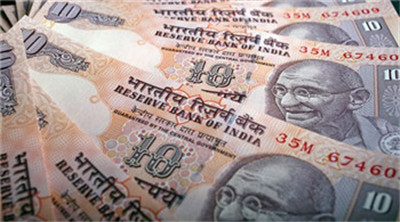(单词翻译:单击)
No one likes to see a tax demand dropping on to the mat, but in India it comes with a special sense of dread. Foreign businesses such as Vodafone and Cairn Energy know the agonies that come with protracted battles with the country’s revenue service. Now it seems global fund managers might be next.
没有人喜欢看到催税单突然飘落在自家地毯上,但是在印度这种情形会引发一种特殊的恐惧感。沃达丰(Vodafone)和凯恩能源(Cairn Energy)等外国企业深知与印度税收部门进行扩日持久斗争的痛苦。如今,全球基金管理公司似乎成了下一个靶子。
Until a few months back, only a handful of tax nerds had heard of India’s minimum alternative tax (MAT), a levy that ensures domestic businesses must hand over a basic portion of profits. That was until some bright spark found a regulatory ruling from 2012, implying that foreign institutional investors might suddenly be liable, despite never having had to pay it before.
一直到几个月前,只有屈指可数的几个税收“怪才”听过说印度的替代性最低税(Minimum Alternative Tax,MAT),该税意在确保国内公司必须缴纳一部分基本利润。然后有个“聪明鬼”发现了2012年的一项监管裁决——这意味着外国机构投资者或许突然间也有了纳税义务,尽管他们以前从未被征收过该税。

Over recent weeks demands have begun arriving at about 100 international funds. Many more of the 6,000 that invest in India could now be hit. Tax experts are peeved, arguing no other country charges foreign equity investors this sort of tax. Fund managers, needless to say, are not best pleased either.
最近几周内,催税单开始抵达约100家国际基金管理公司。在印度投资的6000家基金管理公司中的更多公司现在可能中枪。税务专家十分气恼,提出没有哪个国家会向外国股票投资人征收这种税。毋庸讳言,基金管理公司的心情也好不到哪去。
“I think people are, for understandable reasons, a little leery of India, given all the tax issues with the Cairns and the Vodafones of this world,” says Hugh Young, the avuncular head of Aberdeen Asset Management in Asia, which this week became the first big fund to admit it had received one of the demands.
“考虑到凯恩和沃达丰之类的公司在印度遭遇的所有税务问题,我觉得人们出于可以理解的原因,对印度有点警觉,”安本资产管理公司(Aberdeen Asset Management)亚洲地区负责人、慈祥大叔杨修(Hugh Young)称。本周,该公司成了第一家承认收到此类催税单的大型基金管理公司。
Oddly, India’s government is frustrated too. Prime minister Narendra Modi has promised to end his country’s record of “tax terrorism”. In that spirit, his government recently changed the law, to ensure that MAT would not apply to foreign funds in future. Perversely, this may even have emboldened the tax authorities to re-look at older cases. If the government claims foreigners are now exempt from MAT, their logic goes, they must not have been exempt before.
奇怪的是,印度政府也很受挫。印度总理纳伦德拉•莫迪(Narendra Modi)曾经承诺结束该国“税收恐怖主义”的过往记录。按照这种精神,他领导的政府最近修改了法律,确保MAT未来不会施加于外国基金。变态的是,这甚至可能让税务当局壮胆,鼓励他们翻查旧案。他们的逻辑是,如果政府宣告外国人现在免征MAT,那么他们过去肯定没有得到豁免。
“Our hands are tied,” says one senior figure in Mr Modi’s government. “We have fixed this issue for the future, but we can’t just intervene randomly. In a democracy, we have to follow legal process. The foreign funds can appeal.”
“我们束手无策,”莫迪政府一名高级人物称,“我们解决了这件事未来的问题,但是我们不能随意干预。在民主体制内,我们必须遵从法律程序。外国基金可以上诉。”
This is a fair point, although it doesn’t disguise the fact there will be a terrible stink if hundreds more funds do now get the demands. Yet this episode also reveals a wider conundrum about tax in India. Mr Modi has pledged to bring harmony to revenue collection. Few doubt his sincerity. Yet seemingly with each promise to improve things, a new row emerges that he seems unable to fix.
这个说法很公正,尽管它没能掩饰住事实——如果还有数百家基金管理公司收到了催税单,这将酿成一件大丑闻。不过,这段插曲也暴露出印度税收制度在更普遍意义上的一个谜团。莫迪承诺让征税工作更加协调。没人怀疑他的真诚。不过,伴随着每一个改善现状的承诺,貌似都会冒出他无法解决的新争执。
Part of this is a rotten inheritance. India’s last government introduced one especially egregious tax change: the so-called “retrospective” amendment, targeting Vodafone and allowing closed tax cases to be reopened. It also gave tax authorities stiff revenue targets, and made foreign companies fair game.
部分麻烦在于他接手的烂摊子。印度上届政府引入了一个特别过分的税收修订:所谓的“溯及既往”(retrospective)修正条款。该条款针对沃达丰,允许对已经结案的税收案件重审。它也给税务部门制定了刚性的税收目标,并使外国公司成了诱人的靶子。
Unwinding this will take time. Meanwhile, taxes still have to be collected from somewhere. India rightly complains that foreign businesses are too ready to complain about paying even reasonable demands. “India is not a tax haven,” Arun Jaitley, finance minister, thundered last week — although there was never much of a chance of anyone mistaking it for one.
逆转这些政策将需要时间。与此同时,税金仍然要从某些地方收上来。印度正确地抱怨,外国企业对合理的征税也老是怨言不断。“印度不是避税天堂,”印度财长阿伦•亚特力(Arun Jaitley)上周大发雷霆——尽管人们从来都不可能搞错这一点。
Yet Mr Modi’s government has a case to answer too. It has taken some steps foreign investors should welcome, such as deciding against launching appeals in cases involving companies such as Shell. But equally it has often muddled through, ducking forthright action that could have stopped future tax flare ups.
不过,莫迪政府也有需要回答的指责。它已经采取了外国投资者会欢迎的某些举措,比如禁止对涉及壳牌(Shell)等公司的数宗案件提起上诉。但同时,莫迪政府往往只是敷衍了事,回避采取到位的行动,一劳永逸地制止未来的税务纠纷。
On foreign funds, India’s government says MAT will not apply in future, but it is powerless to stop investigations into older cases. Tax experts dispute this, claiming that legal changes or other rulings could make clear that the tax was never meant to apply to foreign funds.
在外国基金管理公司的问题上,印度政府称MAT未来将不适用,但它无力阻止对旧案重启调查。税务专家对此反驳称,法律修改或其他裁决可以明确该税种从来不应适用于外国基金。
Mr Modi has made slow progress fixing other structural problems underpinning India’s history of tax disputes. Most obvious was his unwillingness to scrap the retrospective amendment, meaning high profile cases involving Vodafone and others will now drag on for years. But there are other problems too, such as lengthy appeals processes, caused by courts that lack resources to clear backlogs.
莫迪在解决其他结构性问题上进展缓慢,这些问题是造成印度税务争端历史的根源。最明显之处在于,他不愿废除“溯及既往”修正条款,这意味着涉及沃达丰等公司的令人瞩目的案件还将没完没了地拖下去。但也有其他问题,比如法院缺少清理积案的资源,导致上诉过程旷日持久。
India’s tax inspection system is highly decentralised too, arguably giving excessive power to individual inspectors. “A tax officer, under Indian law, is supreme. His power cannot be questioned,” says Dinesh Kanabar, a Mumbai-based tax expert. “There is no accountability. Each officer can pass almost any order he wants, no matter how outrageous it is.” Of course, not every tax demand fits this description. But ending those that do would be in everyone’s interest.
印度的税务稽查体系也高度分散,可以说给予了个别稽查员过多的职权。“根据印度法律,税务官是至高无上的。他的权力不容置疑,”孟买税务专家迪内希•卡纳巴(Dinesh Kanabar)称,“不存在责任追究制度。每一个税务官可以批准几乎任何他想要的命令,无论有多离谱。”当然,并非每一份催税单都符合这种描述。但是制止那些符合这种描述的催税单符合各方的利益。


